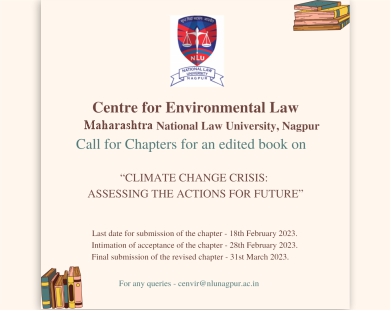About the University
MNLU, Nagpur — the nineteenth National Law University in the country, was established by the Government of Maharashtra by enacting the Maharashtra National Law University Act (Maharashtra Act No. VI of 2014). Located in the Orange City of Nagpur, Maharashtra, the University endeavours to impart excellence in knowledge and professionalism. The University has marked rapid progress towards its dream of achieving excellence in the field of legal education with the aid of its dedicated faculty members, staff and students, working under the able guidance and supervision of its founding members, visionaries, well-wishers and members of different statutory bodies of the University. The University works with the primary objective of advancing and disseminating the knowledge of the law and of developing a sense of responsibility among the students and research scholars of serving society by furthering their advocacy and legal service skills via organizing lectures, seminars, symposia, conferences and capacity building programmes. Further, the University not only aspires to promote legal knowledge but also to make law and legal processes – efficient instruments of social justice and development, to promote and foster the rule of law and the objectives enshrined under the Constitution of India.
About the Centre for Environmental Law
The Centre for Environmental Law (CEL) established at the National Law University, Nagpur, (MNLU, Nagpur), is an endeavour of the University to respond to the need for legal scholarship in the area of conservation of the environment and various components of the same – such as forests, biodiversity, pollution control, arresting climate change, improving environmental awareness and education, etc. With this commitment, the Centre undertakes interdisciplinary studies involving legal academia and the other stakeholders involved in the conservation of the environment and preservation of its wholesomeness. The Centre believes in promoting environmental sustainability through action-oriented education, awareness and advocacy.
About the Book
The Centre for Environmental law, to achieve its goal of disseminating knowledge and furthering the cause of environmental sustenance, invites chapters for publication in this book. The tentative title for the book is “CLIMATE CHANGE CRISIS: ASSESSING THE ACTIONS FOR FUTURE”. The book attempts to provide an overview of the present issues concerning climate change and the various dynamics attached to it. Considering that the issue of climate change is often ignored in the backdrop of development and advancement, by countries all around the globe, this book aims to highlight the importance of climate change and afford better solutions towards climate and environmental sustenance. This book will be published by one of the leading publishers.
Themes
The central theme of this book is the crisis accelerated by climate change and the chapters will focus on various problems, consequences and impacts of climate change, and how legal systems can help in mitigating these consequences.
Sub-Themes
- Climate change and the Indian legal framework
- Climate change and International legal regime
- Climate change and global politics
- Climate change and gender
- Climate change and migration
- Climate change and indigenous communities
- Climate change and international trade
- Climate change and green finance
- Climate change and the fashion industry
-
Climate change in literature and literary studies
Note: The given sub-themes are only indicative and not exhaustive. The submissions are not restricted to the sub-themes but must adhere to the central theme of the book.
Guidelines for Authors
- Co-authorship of only one co-author is allowed.
- Submissions are invited from legal practitioners, academicians, and researchers. Entries from students may also be accepted, provided they co-author it with legal practitioners, and/or academicians, and/or researchers.
- Submissions must be in the form of chapters, ranging from 3,000 to 6,000 words, exclusive of footnotes.
- All submissions must be made in MS Word Document format (.doc/.docx) only, having ‘Times New Roman’ font, with font size of 12, and line spacing of 1.5 with justified alignment.
- The MS-word file of the manuscript must be named in the following manner: o Name of the Author and Co-author (if any) followed by the title of the work.
- Example “Amit Gupta_Climate Action and Developing Nation”
- “Amit Gupta_Narendra Singh _Climate Action and Developing Nation”
- The manuscript shall be accompanied by a brief profile of the author, including- Name of the author(s), affiliation, e-mail address and contact number.
- Authors must follow the OSCOLA 4th Edition.
- The manuscript submitted must not be previously published or currently under review at any other journal/conference/book and should also not be submitted to any other journal/conference/book while under review with us.
- The manuscript must be the original work of the author and free from plagiarism. Any form of plagiarism detected will lead to disqualification as per the UGC Regulations.
- Editors shall reserve the right to change/ modify/ alter the text of the manuscript submitted by the authors before publication.
-
The final decision as to acceptance and publication of the manuscript rests with the Editorial board.
Guidelines for Submission
-
All the submissions must be made through the link provided. Submissions through any other medium will not be considered.
BROCHURE: CEL- MNLU – Call for Chapters – Climate Change
Important Dates
-
Last date for submission of the chapter — 18th February 2023.
-
Intimation of acceptance of the chapter — 28th February 2023.
-
Final submission of the revised chapter — 31st March 2023.
Contact Details:
For further queries, the following may be contacted:
- Rajas Salpekar (Student Editor), rajassalpekar@nlunagpur.ac.in, +91 9370908899.
- Shivam Sharma (Student Editor), shivamsharma@nlungapur.ac.in, + 91 8818972039.
- Ishika Patodi (Student Editor), ishikapatodi@nlunagpur.ac.in, +91 9826329090.
-
Sukriti Nigam (Student Editor), sukritinigam@nlunagpur.ac.in, +91 7571975540.






